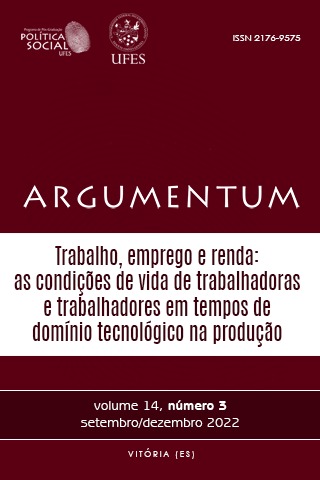A centralidade do trabalho na chamada era informacional
DOI:
https://doi.org/10.47456/argumentum.v14i3.37248Abstract
O texto que se segue buscará abordar como, a partir das transformações na esfera produtiva (pós-1950), as primeiras teses sobre o fim da centralidade do trabalho começaram a ganhar corpo. Para isso, irá se estruturar a partir de dois momentos: primeiro, buscará explicitar o significado da tese da centralidade do trabalho, aqui entendida também como modelo da práxis social (ou protoforma da vida social) – algo muito mais amplo do que a diminuição do trabalho vivo na indústria. Em seguida, iremos abordar, de modo panorâmico, algumas das principais (e primeiras) teses que passaram a advogar a perda da importância decisiva do trabalho (e dos seus agentes) na reprodução da sociedade, as suas consequências, assim como iremos situar o sentido dessa afirmativa no início do século XXI à luz do que vem sendo chamado de precarização estrutural do trabalho na chamada era informacional-digital.
Downloads
Downloads
Published
How to Cite
Issue
Section
License
Copyright Transfer Agreement
As a condition for submission, the authors must agree with the Copyright Transfer Agreement, by checking the box after reading the clauses.
The author(s) (hereinafter "AUTHOR") hereby agrees to transfer, without any financial compensation, the property of copyrights regarding Argumentum, a journal of the Postgraduate Program in Social Politics (Programa de Pós-graduação em Política Social), Federal University of Espírito Santo (Universidade Federal do Espírito Santo) - Av. Fernando Ferrari, 514 - Goiabeiras 29075-910, Vitória (Brazil), (hereinafter "ARGUMENTUM"), according to the following terms and conditions:
1. I am aware of the terms of "Care Ethics Research Guide" described in the Policies section.
2. AUTHOR warrants to be the writer and copyright holder of the WORK submitted.
3. AUTHOR declares that the WORK does not infringe the rights of third-parties; that the distribution of images (if existent) was authorized; and that AUTHOR assumes total moral and property responsibility for their content.
4. AUTHOR agrees to transfer all the copyrights concerning the WORK to ARGUMENTUM, especially the rights to edit, publish, translate into another language, and reproduce it through any process or technique. ARGUMENTUM becomes the exclusive owner of the rights regarding the WORK, and any total or partial reproduction, in any other medium, printed or electronic, is strictly forbidden without prior written consent by ARGUMENTUM.
5. The copyright transfer is unpaid and, therefore, there will be no monetary compensation whatsoever by ARGUMENTUM in order to use the TEXT.

